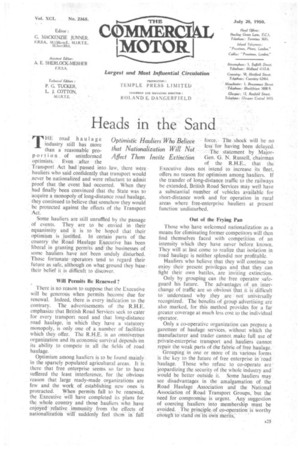Heads in the Sand
Page 27

If you've noticed an error in this article please click here to report it so we can fix it.
rE road haulage industry still has more than a reasonable proportion of uninformed optimists. Even after the Transport Act had 'passed into law, there were hauliers who said confidently that transport would never be nationalized and were reluctant to admit proof that the event had occurred. When they • had finally been convinced that the State was to acquire a monopoly of long-distance road haulage, they continued to believe that somehow they would be protected against the effects of the Transport Act.
Some hauliers are still unruffled by the passage of events. They are to be envied in their equanimity and it is to be hoped that their optimism is . justified. In certain parts of the country the Road Haulage Executive has been liberal in granting permits and the businesses of some hauliers have not been unduly disturbed. Those fortunateoperators tend to• regard their future as safe, although on what ground they base', their belief it is difficult to discover.
Will Permits Be Rene-wed ?
There is no reason to suppose that the Executive will be generous when permits become due for renewal. Indeed, there is every indication to the contrary. The advertisements of the R.H.E. emphasize that British Road Services seek to cater for every transport need and that long-distance road haulage, in which they have a statutory monopoly, is only one of a. number of facilities which they. offer. The R.H.E. is an omniverbus organization and its economic survival depends-on its ability to compete in all the fields of road: haulage.
Optimism among hauliers is to be found mainly , in the sparsely populated agricultural areas. It is: there that free enterprise seems so far to have suffered the least interference, for the obvious reason that large ready-made organizations are few and the work of establishing new ones is protracted. When permits fall to be renewed, the Executive will have completed its plans for the whole country and those hauliers who have enioYed7elative immunity from the effects of nationalizatiOn 'Will suddenly feel them 'In hill force., The shock will be no 'less' for having been delayed.
• 'The statement by Major. Gen. G. N. Russell, chairman of the R.H.E., that the Executive does not intend to increase its fleet, offers no reason for optimism among hauliers. If the transfer of long-distance traffic to the railways be extended, British Road Services may well have a substantial number of vehicles available for short-distance work and for operation in rural areas where free-enterprise hauliers at present function undisturbed.
Out of the Frying Pan Those who have welcomed nationalization as a means for eliminating former competitors will then find themselves faced with competition of an intensity which they have never before known. They will at last come to realize that isolation in road haulage is neither splendid nor profitable. • Hauliers who believe that they will continue to enjoy their present privileges and that they can fight their own battles, are inviting extinction.
Only by grouping can the free operator safeguard his future. The ,advantages. of an interchange of traffic are so obviouS that it is difficult to •understand .why they are not universally recognized.. The benefits of grdtiP advertiSing are also marked, for this method provides for a far greater coverage at much less cost to the individual operator.
Only a co-operative organization can prepare a gazetteer of haulage services, without which the manufacturer and trader cannot make full use of private-enterprise transport 4t-td. hauliers *cannot repair the weak parts of the fabric of free haulage. Grouping in one or more of its various forms is the key to the future of free enterprise in 'road haulage. Those who refuse to co-operate are • jeopardizing the security of the whole industry and would be better outside it. Some hauliers may . see disadvantages in the amalgamation of the Road Haulage Association and the National Association of Road Transport Groups, but the' need for compromise is urgent. Any suggestion of coercing hauliers into membership must be avoided. The principle, of co-operation is worthy ënouglfio stand On its nmêrits,












































































